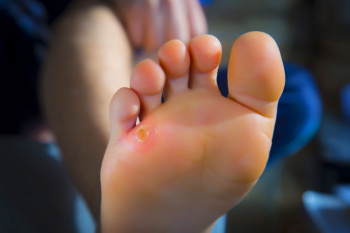
Wilmington (937) 382-2347
Fax
(513) 932-1606

Wilmington (937) 382-2347
Fax
(513) 932-1606

A foot corn is a thick, hardened area of skin that forms due to repeated friction or pressure. It most commonly appears on the toes or the soles of the feet, where shoes or other foot coverings create constant rubbing. Corns can develop on the top of the toes, between the toes, or on the heels, often causing discomfort or pain when walking. The primary cause of corns is wearing ill-fitting shoes that do not provide enough room or support. Tight shoes, high heels, or sandals that do not properly align the foot can all contribute to the formation of corns. To prevent foot corns, wearing shoes that fit properly and provide sufficient cushioning is essential. Corns can cause pain and discomfort, and it may become difficult to complete daily activities. If you have developed a corn, it is suggested that you contact a podiatrist who can offer you effective relief and prevention techniques.
If you have any concerns regarding your feet and ankles, contact Dr. Gerald Perelman of Ohio. Our doctor will treat your foot and ankle needs.
Corns: What Are They? and How Do You Get Rid of Them?
Corns can be described as areas of the skin that have thickened to the point of becoming painful or irritating. They are often layers and layers of the skin that have become dry and rough, and are normally smaller than calluses.
Ways to Prevent Corns
There are many ways to get rid of painful corns such as wearing:
Treating Corns
Treatment of corns involves removing the dead skin that has built up in the specific area of the foot. Consult with Our doctor to determine the best treatment option for your case of corns.
If you have any questions please feel free to contact our office located in Wilmington, OH . We offer the newest diagnostic and treatment technologies for all your foot and ankle needs.